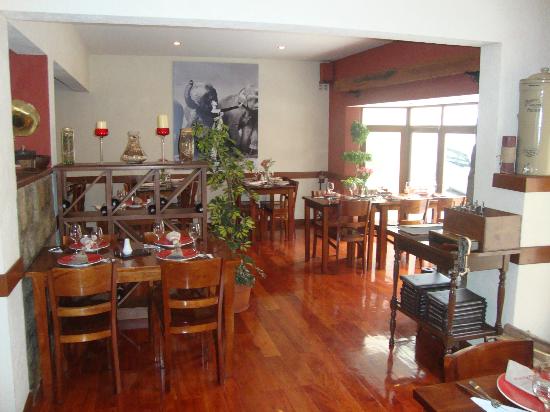I thought I liked her at first. She also prefers La Paz over Cuzco, which is a rare thing in these parts. I dislike Cuzco because it’s too touristy. She dislikes it because beyond the touristy parts, it’s too poverty-stricken. She made some good points: There are no good grocery stores in Cuzco. There are no movie theaters. La Paz totally wins. But then she began telling me about Arequipa: It’s lovely and green. The weather is warm and sunny. It’s just a few hours from the ocean. This also means fresh seafood. But then…It has Starbucks “and all those chains that are so nice.” She went on about the luxuries of American chains in Arequipa for quite some time. Shopping malls and fast food. And she essentially suggested that Arequipa is a nice place because you can pretend you’re living in North America, except for speaking Spanish.
I was getting annoyed, and was glad when Carrie started talking to us about her upcoming trip to Cuzco. She was especially excited because until that morning her passport had been in immigration, awaiting residency. So, of course then we started talking about residency. Gerard complained that his permanent residency was held up because during his first 1 year residency he hadn’t applied for a carnet (neither did I…). Cara complained that her residency took too long and she eventually had to threaten her lawyer “If you get it by tomorrow, I’ll give you $500. If you don’t I won’t pay you anything.”
Ah, such luxury. This really annoyed me, I suppose. Maybe it has something to do with the fact that I literally almost died trying to get my residency. It would have been nice to just pay some lawyer to do everything for me. Discussions of residency also make me angry because I felt kind of exploited by my job who did nothing to help me get mine. And I get frustrated, because as a US citizen it’s about 100 times harder for me to get residency than any other nationality.
But mostly, it makes me think about global inequalities. It makes me think about all of my Bolivian friends who I would love to invite to visit me, and would love to do so. But they can’t even get a 1 week tourist visa to my country. Because they might try to stay and work illegally. Or be cocaine-toting socialist-terrorists. Or something.
But of course out of all this Karen pipes up and tells me that the new Olivers needs a manager and I should ask D for the job and stay forever. Which would be lovely. Except I am currently in the life-mode where I’m a little too proud of having a Ph.D. to want to be a bar manager. It is tempting. I feel like I started having a life here, and going back to the US never really sounds enticing. I love my family, certainly, but other than them and a handful of friends who are scattered all over the northern 1/3 of the American continent, it would not make me sad at all to never return (ok, not never, but for a while). But despite all my longing to stay in this place, when people suggest I work in a bar, it offends me just a little. I want to shout “Do you really think I spent 6 years getting a Ph.D. so that I can serve a bunch of ugly llama sweater wearing 19 year old gap-yah kids ridiculously cheap vodka?”
I guess I just want a little respect for all the work I put in. I mean, yes, I acknowledge all the privilege it took to get here. It wasn’t just about hard work. But at least among the people at the table Friday night, all of whom were certainly enjoying the La Paz ex-pat privilege, I wanted a little respect. And then the bill came. Which is to say that the bill did not come. The whole time I had been worried that the 400 bolivianos in my wallet was not going to be enough to cover my 4 course meal and the endless bottles of champagne we were drinking. But alas, James and the owner had worked out a deal, and most of us were paying nothing.
I thought about the birthday celebrations I went to Monday and Wednesday of that same week for Bolivian friends. Both were in Mechanical Wood, a nice bar just a few blocks away in Sopocachi. We drank Paceña beers or pitchers of vodka and sprite. We ate onion rings and spinach nuggets. We talked about our favorite villains from movies and children’s cartoons. We made silly future life plans. We promised to attend each other’s upcoming concerts. And I felt like part of something. At Carrie’s party I felt like I was struggling to distance myself from something that felt very fake. That felt exploitative and superficial. And as much as I appreciated Karen’s offers of help, I just couldn’t help but feel these people who shared so much more in common with me didn’t understand me nearly as well as the friends I had celebrated with earlier in the week.


 RSS Feed
RSS Feed
